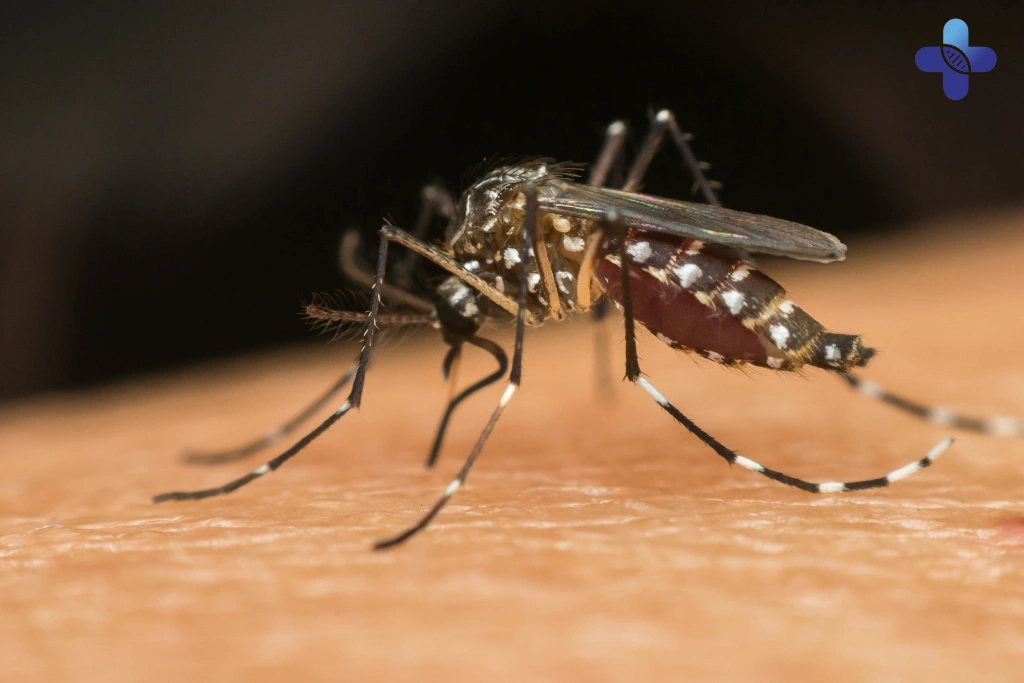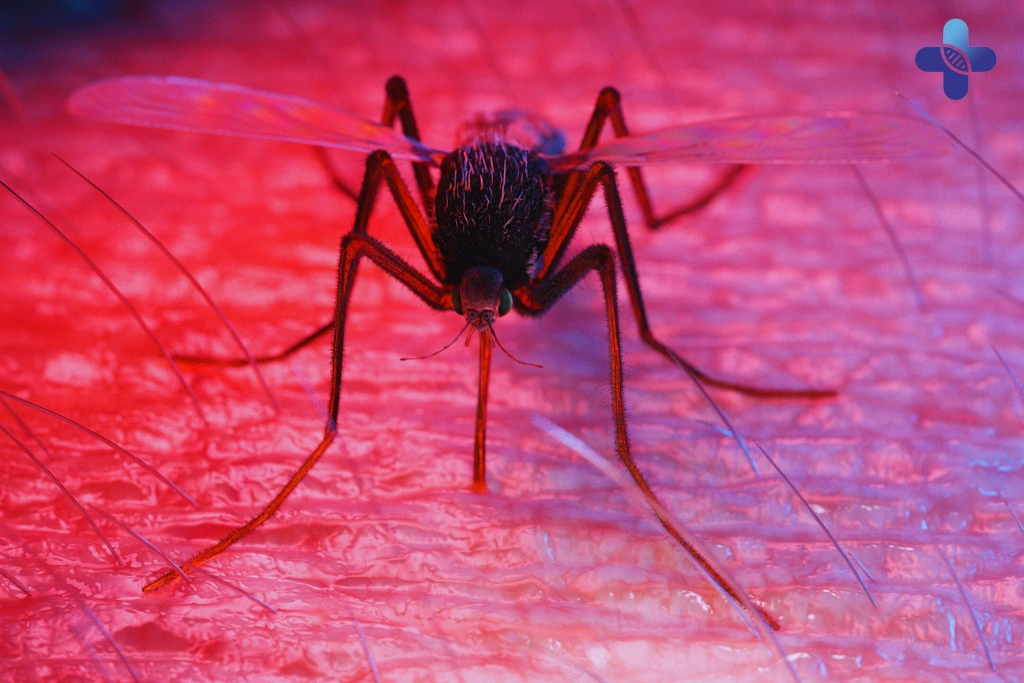Mosquito bites in Bali may seem like a small inconvenience, but in a tropical environment they can carry much more serious risks. Warm weather, lush vegetation, and year-round humidity make the island an ideal breeding ground for mosquitoes that can transmit illnesses such as chikungunya and dengue fever. Many travelers dismiss the first itch without realizing it could be the starting point of a mosquito-borne illness. By understanding the real dangers and learning effective prevention strategies, you can enjoy your Bali experience while staying safe and healthy.
Mosquito Bites in Bali – More Than Just an Itchy Nuisance

For many travelers, mosquito bites in Bali are seen as nothing more than a mild annoyance, easily brushed aside while enjoying the island’s beauty. But in a tropical climate, these small bites can be the starting point of more serious health concerns, including chikungunya and dengue fever. The warm, humid environment allows mosquito populations to thrive, increasing the risk of mosquito-borne illnesses that can disrupt your trip if not addressed early.
Imagine a traveler spending their first days in Bali exploring outdoor spots, casually ignoring a few mosquito bites on their legs and arms. A few days later, they begin to feel feverish, experience joint pain, and notice a rash spreading. This scenario is more common than many realize, and it highlights why visiting a trusted Medical Clinic Bali such as Life Everyouth Bali for early assessment can make a crucial difference. Whether it’s preventive advice or rapid treatment, a reputable Bali Medical Clinic ensures your holiday remains both safe and memorable.
Why Mosquito Bites in Bali Deserve Your Attention

Bali’s tropical environment is a paradise for travelers, but it is equally inviting for mosquitoes. The island’s warm temperatures, frequent rainfall, and lush greenery create perfect breeding grounds for mosquito populations to flourish. In such conditions, the risk of contracting mosquito-borne illnesses increases significantly, especially in areas where people spend extended time outdoors. This is why travelers and expats are encouraged to take preventive measures seriously rather than dismissing mosquito bites as harmless.
What makes mosquito bites in Bali particularly concerning is the variety of diseases they can transmit. Unlike in cooler climates, the species here—such as Aedes aegypti—are capable of carrying viruses like chikungunya and dengue fever. Seeking advice from a Medical Clinic in Bali, such as Life Everyouth, can help you understand the local health risks and equip you with strategies to avoid infection. A quick consultation can also provide access to repellents, protective measures, and prompt testing if symptoms appear.
Chikungunya – The Overlooked Risk
Chikungunya is one of the lesser-known mosquito-borne illnesses in Bali, yet it poses a significant health threat to travelers. Its symptoms often begin with sudden high fever, intense joint pain, headaches, and rash, which can easily be mistaken for dengue fever or seasonal flu. Because of this similarity, many cases go undiagnosed or are treated too late, prolonging discomfort and recovery time. Early detection at a reputable Bali Medical Clinic like Life Everyouth Bali ensures accurate diagnosis and targeted care. You can learn more about symptoms, recovery, and prevention in our full guide to Chikungunya in Bali.
One of the most challenging aspects of chikungunya is its lingering joint pain, which can last for weeks or even months after the initial infection. This prolonged recovery can disrupt travel plans, work commitments, and overall quality of life. By visiting a Medical Clinic Bali at the first sign of symptoms, you can receive professional care, hydration therapy, and monitoring that may shorten your recovery period. The key is not to underestimate joint pain or fever that appears after mosquito exposure.
Other Mosquito-Borne Illnesses
While chikungunya is a concern, it is far from the only mosquito-related risk in Bali. Dengue fever remains one of the most common illnesses transmitted by mosquitoes on the island, with outbreaks often peaking during the rainy season. Its symptoms—high fever, severe headaches, muscle and joint pain, and rash—can escalate quickly, making early medical attention vital. For a detailed breakdown of dengue symptoms and treatment, visit our comprehensive resource on Dengue Fever in Bali.
Beyond dengue, other mosquito-borne illnesses like Japanese encephalitis and Zika virus have been reported in parts of Indonesia. Although less common in Bali, travelers should remain aware of these risks, especially if spending extended time outdoors or in rural areas. Preventive measures, combined with prompt medical evaluation at a Bali Medical Clinic, significantly reduce the likelihood of severe complications. Prevention and awareness remain your strongest defenses against these tropical health threats.
Recognizing Early Symptoms After a Bite
The first signs after mosquito bites in Bali can be subtle, yet they are important warning signals not to ignore. Mild fever, muscle aches, joint discomfort, or an unusual sense of fatigue can develop within a few days of being bitten. In many cases, these symptoms are brushed off as travel exhaustion or a common cold, delaying proper medical evaluation. Visiting a Medical Clinic Bali like Life Everyouth at this early stage can make a significant difference in detecting mosquito-borne illnesses before they progress.
Another early indicator to watch for is the appearance of a rash, often accompanied by itching and redness that spreads beyond the initial bite area. In infections like dengue fever or chikungunya, rashes can be patchy, inflamed, and sometimes tender to the touch. Recognizing these patterns early and consulting a trusted Medical Clinic in Bali ensures you receive the right tests and immediate care. Quick intervention can reduce the risk of severe complications and speed up recovery.
Joint pain, especially if it becomes intense or affects multiple areas, should never be underestimated. While it might seem unrelated to mosquito bites, this symptom is a hallmark of chikungunya and can also appear in dengue cases. A thorough check-up at a Bali Medical Clinic such as Life Everyouth Bali can confirm the cause, guide treatment, and provide supportive care such as IV Drip Therapy to manage fever, pain, and dehydration. Early action is the best safeguard for your health and your travel plans.
Practical Prevention Tips for Travelers

Avoiding mosquito bites in Bali starts with simple yet effective habits. Wearing light-colored, loose-fitting clothing that covers your arms and legs can significantly reduce your exposure. Mosquitoes are most active during early mornings and late afternoons, so plan outdoor activities around these peak times when possible. For added protection, choose accommodations that use mosquito nets or have well-sealed windows and doors. Staying mindful of these details can greatly lower your risk of encountering mosquito-borne illnesses.
Using a reliable insect repellent is another key preventive measure. Opt for repellents containing DEET, picaridin, or oil of lemon eucalyptus, and apply them consistently—especially after swimming or sweating. Many Medical Clinic Bali locations, including Life Everyouth, can recommend or provide effective repellents suitable for your skin type. You can explore more preventive strategies in our dedicated article on Preventing Mosquito-Borne Illnesses in Bali. By making repellent application part of your daily routine, you can protect yourself without disrupting your travel plans.
Don’t wait for symptoms to worsen. Get checked and recover faster with our professional IV Drip Therapy in Bali. Book now and let our Medical Clinic in Bali, such as Life Everyouth Bali, provide comprehensive care if you’ve been bitten and start to feel unwell. Combining preventive steps with access to a trusted Bali Medical Clinic ensures that even if a bite occurs, you’re prepared to act quickly and stay healthy throughout your stay.
What to Do If Symptoms Appear
If you notice symptoms such as fever, joint pain, rash, or unusual fatigue within days of mosquito bites in Bali, the first step is to rest and monitor your condition closely. Avoid self-medicating with painkillers like aspirin or ibuprofen until you have consulted a doctor, as these may increase the risk of complications in certain mosquito-borne illnesses. Stay well-hydrated, ideally with water or electrolyte-rich drinks, to support your body’s immune response. Taking these immediate steps can help stabilize your condition while you arrange for medical evaluation.
The next crucial action is to visit a reputable Medical Clinic Bali, such as Life Everyouth Bali, for proper diagnosis. Clinics equipped with rapid testing can determine whether you are dealing with dengue fever, chikungunya, or another illness within minutes. This allows doctors to tailor your treatment quickly and prevent worsening symptoms. Seeking help from a trusted Bali Medical Clinic also ensures you receive professional monitoring, which is particularly important for travelers who may not be familiar with local healthcare systems.
If your symptoms escalate—such as persistent high fever, severe joint or muscle pain, uncontrolled vomiting, or bleeding gums—seek emergency medical care immediately. In these situations, prompt attention at a Medical Clinic in Bali can be lifesaving. Facilities like Life Everyouth not only provide medical assessments but can also administer IV Drip Therapy to manage dehydration and speed recovery. Acting quickly when symptoms appear is the best way to protect both your health and your holiday experience.
Conclusion Mosquito Bites in Bali: Risks and Prevention

Mosquito bites in Bali may seem harmless at first, but they can be the starting point for serious mosquito-borne illnesses like chikungunya and dengue fever. Prevention remains your strongest defense—covering up with protective clothing, using effective repellents, and avoiding peak mosquito activity hours. If you do get bitten, paying attention to early symptoms and seeking advice from a trusted Medical Clinic Bali such as Life Everyouth Bali can make all the difference in keeping your trip safe and enjoyable.
Early detection and rapid treatment are essential for preventing complications and speeding recovery. By knowing when to consult a Medical Clinic in Bali and having access to services like IV Drip Therapy, you can respond effectively if symptoms appear. With the right precautions, timely medical care, and awareness, you can explore Bali confidently, staying both itch-free and healthy throughout your journey.
Frequently Asked Questions (FAQ) Mosquito Bites in Bali: Risks and Prevention
Are mosquito bites common in Bali?
Yes, mosquito bites are common in Bali due to the island’s tropical climate, which provides an ideal environment for mosquito breeding year-round. The warm temperatures, high humidity, and frequent rainfall create conditions where mosquito populations thrive, especially in lush, green areas and near standing water. While most bites are harmless, some can carry viruses like dengue or chikungunya, making it important to take preventive measures and seek care from a trusted Medical Clinic Bali like Life Everyouth if symptoms develop.
Which diseases can mosquitoes transmit in Bali?
Mosquitoes in Bali can transmit several illnesses, the most common being dengue fever and chikungunya. In rare cases, other mosquito-borne diseases such as Japanese encephalitis and Zika virus have been reported in parts of Indonesia. These illnesses can cause symptoms ranging from mild fever and rash to severe joint pain and prolonged fatigue. Visiting a Medical Clinic in Bali ensures you receive accurate information about current health risks and testing if you have concerns after being bitten.
How soon do symptoms appear after a bite?
Symptoms can appear within 3–7 days after being bitten by an infected mosquito, although the exact timeline depends on the disease. Dengue fever typically develops within a week, while chikungunya symptoms may appear in just a few days. Early signs like mild fever, muscle aches, or rash can be easy to dismiss, but prompt assessment at a Bali Medical Clinic such as Life Everyouth Bali allows for early diagnosis and intervention, which can greatly improve recovery outcomes.
Can chikungunya be severe?
Yes, chikungunya can be severe in terms of discomfort and recovery time, even though it is rarely fatal. The illness often causes intense joint pain, high fever, rash, and fatigue, with joint discomfort sometimes lasting for weeks or even months. This prolonged recovery can disrupt travel plans and daily activities. Seeking early care at a Medical Clinic Bali ensures you receive supportive treatments—such as IV Drip Therapy—to manage symptoms effectively and reduce recovery time.
How do I know if it’s chikungunya or dengue?
Both chikungunya and dengue share similar symptoms like fever, joint pain, and rash, making them difficult to distinguish without testing. However, chikungunya tends to cause more severe and prolonged joint pain, while dengue often involves more intense headaches and a higher risk of complications like bleeding. The only way to confirm the diagnosis is through medical testing at a Bali Medical Clinic such as Life Everyouth, where rapid tests can deliver results quickly and guide the right treatment plan.
Are mosquito repellents available locally in Bali?
Yes, mosquito repellents are widely available in Bali, from convenience stores to pharmacies. However, the concentration of active ingredients like DEET or picaridin may vary, and some products might not be as strong as those available in your home country. For reliable options, you can ask a Medical Clinic in Bali such as Life Everyouth for recommendations or purchase repellents directly from trusted suppliers to ensure their effectiveness.
Do hotels in Bali provide mosquito nets?
Many hotels and resorts in Bali, especially in rural or coastal areas, provide mosquito nets as part of their room amenities. Luxury resorts may rely more on screened rooms and air conditioning for protection. If you are staying in budget accommodations or guesthouses, it’s wise to confirm beforehand whether nets are provided. Regardless of your accommodation, using repellent and practicing other preventive measures is still essential to minimize your risk.
Is IV Drip Therapy suitable for recovery from mosquito-borne illnesses
Yes, IV Drip Therapy can be a valuable part of recovery, particularly for illnesses like dengue fever or chikungunya, where hydration and nutrient replenishment are important. It delivers fluids, electrolytes, and vitamins directly into the bloodstream, helping to combat dehydration, fatigue, and immune depletion. At Life Everyouth Bali, a trusted Medical Clinic in Bali, IV Drip Therapy is administered by trained medical professionals to ensure safety and effectiveness.
Can I swim after being bitten by mosquitoes?
Yes, you can generally swim after being bitten by mosquitoes, as the bite itself is not contagious or dangerous in water. However, if the bite becomes inflamed, infected, or if you are feeling unwell due to symptoms like fever or fatigue, it’s best to rest and avoid swimming until you’ve been evaluated at a Medical Clinic Bali. Swimming while unwell could worsen dehydration or slow your recovery from any underlying illness.
Where can I get tested and treated for mosquito-borne illnesses in Bali?
You can get tested and treated at reputable medical facilities across the island, with clinics like Life Everyouth Bali providing rapid testing for dengue fever, chikungunya, and other mosquito-borne diseases. These clinics are equipped to offer both diagnosis and treatment, including IV Drip Therapy, to help you recover faster. Visiting a Bali Medical Clinic at the first sign of symptoms ensures timely care and reduces the risk of complications, allowing you to get back to enjoying your trip.
